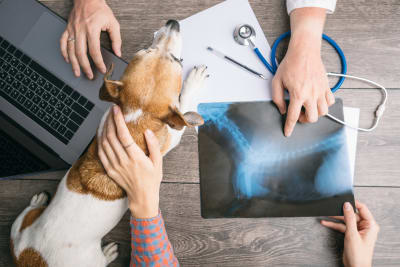What Can Dog X-rays Help Vets Diagnose?
X-rays are one of the most helpful and frequently used diagnostic tools in healthcare—whether that be for humans or pets. X-rays can help your South Wilton vets to get a better view of your pet's internal; structures like bones and tissues as well as their internal organs to diagnose health issues like bladder stones, broken bones, swallowed foreign objects, and more.
X-ray images can help vets to spot some tumors, pregnancy, and enlarged organs which may lead to a diagnosis such as heart disease or cancer.
A detailed view of organs, tissues, and ligaments cannot be obtained using x-ray technology. In these cases, other diagnostic imaging such as MRI and Ultrasound is more beneficial.
An x-ray of a pregnant dog can also help users to prepare for the birth of puppies by revealing how many your dog is expecting and whether a c-section may be required.
Learn More About Our Diagnostic Lab
How Can I Prepare For My Dog's X-ray Appointment?
An x-ray will often be done when an animal is brought in to have issues assessed by a veterinarian. Because of this, no preparation is required. Your vet will be able to examine your pet and then, if an x-ray is required, they will take some time to walk you through the procedure and what they will be looking for from it.
Will My Dog Be Sedated When They Have Their X-ray?
Sedation is sometimes required to get a clear x-ray. If your dog is calm, not in too much pain, and able to lay in a comfortable position while the x-ray is being taken, sedation will not be necessary.
On the other hand, if your pup is squirming, edgy, or in pain, sedation may be recommended by your vet. Some other reasons why sedation may be advised during your pup's x-ray includes if your dog's muscles need to be relaxed to gain a clear image or when the ray is of their spine, skull, or teeth.
Are X-rays Safe For Dogs?
While x-rays are generally considered quite safe for dogs, there is radiation involved. Because of this, x-rays are only used occasionally and only as a diagnostic tool. In some cases, vets will use x-rays to gain information about a dog's pregnancy, but other kinds of imaging like ultrasound devices may be used in those cases.
If you're concerned about the use of x-ray technology and your dog's health, speak to your vet. Your veterinarian will be able to give you an understanding of the risks versus the benefits in your dog's particular case so that you can decide whether you want your dog to have an x-ray.
How Much Will My Dog's X-rays Cost?
There are many factors at play that may affect the cost of your dog's x-ray, including the size of your pet, the area being x-rayed, and whether or not sedation was used. It may also be affected by the area your clinic is located and the kind of veterinary clinic it is. If you are worried about the cost of your dog's x-ray, ask your vet for an estimate before the procedure.
Note: The advice provided in this post is intended for informational purposes and does not constitute medical advice regarding pets. For an accurate diagnosis of your pet's condition, please make an appointment with your vet.
If your dog requires emergency care during routine business hours, contact us as soon as possible. At South Wilton Veterinary Group, our team uses diagnostic image technologies like x-rays to provide you with quick and precise diagnoses.
 Looking for a vet in South Wilton?
Looking for a vet in South Wilton?
We're always accepting new patients, so contact our veterinary hospital today to book your pet's first appointment.
Related Articles View All
C-Section for Dogs: Everything You Should Know
Our South Wilton vets share some information about c-sections in dogs, when they might be needed, and what you can expect.
Enucleation: Eye Removal in Cats & Dogs
Learning that your cat or dog needs eye removal surgery can be upsetting, and you'll probably have many questions. Our veterinarians in South Wilton explain pet eye removal, recovery times, potential complications, and more.
Why does my pet need a urinalysis?
Your vet can perform a urinalysis to determine whether your cat or dog may have a health condition or disease that needs treatment. Here, our South Wilton veterinarians explain why regular urinalysis testing for pets is a critical part of their care.
Understanding Blood Tests for Dogs
Dogs and cats often require diagnostic blood tests to reveal vital health information about underlying health conditions. In this post, our veterinarians at South Wilton explain the significance of these tests for pets.

